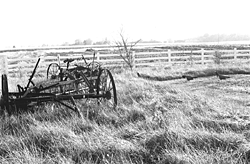

Two years ago, Gerry Gross was working in a garden center when he heard about a new opportunity.
"A friend walked in and said this job would be perfect for me," he said. The job was running an organic farm two miles from Oberlin. Since then, Gross has been the grower, and sole paid employee, of the Oberlin Sustainable Agriculture Project.

OSAP began in 1996 with a meeting held by two members of the Oberlin Student Cooperative Association. Other people in the College and the local community soon got involved, planning an ambitious project to bring sustainable agriculture to Oberlin. Currently the organization is run by a six-member Board of Trustees including students, members of the College faculty and staff and other Oberlin residents.
OSAP Trustee Brad Masi OC '95, who also works as project assistant in the Environmental Studies Department, describes OSAP's mission as "promoting the creation of a sustainable food economy through management of an organic farm, a farmer's market, and educational programs."
"[Besides an alternative to large, corporate farms,] we also see ourselves as an alternative to urban sprawl, a big problem in this area," said Masi.
OSAP's Community Supported Agriculture program is one of its most important functions. Through this program, anyone in the community can purchase a share in OSAP in the early months of the year. Share prices run from $45 to $400, and in return for their investment shareholders receive produce from OSAP's farm. They pick up their goods at OSAP's farmer's market, which is held weekly from May through October.
Masi sees this system as a model for economically viable agriculture. Most farmers do not have a source of income in the winter months, and many lost their farms because of this problem. Community Supported Agriculture allows OSAP to get cash up front when they need it to buy seeds and supplies. OSCA participates in the program by giving OSAP a $7,000 loan, which is paid back when OSCA purchases tons of produce for its dining co-ops. There is also a low-income outreach effort, and OSAP will soon begin accepting food stamps.
"We're trying to reach the whole community," Masi said.
OSAP's eight-acre farm, leased to them by a private owner, is located about two miles from Oberlin on Pyle-South Amherst Road. Gross works there throughout the year.
"In January I order seeds and start planning for the coming season," he said. "In February I start seeding in the greenhouse, and in March I start planting." Harvesting begins in April and continues into December.
Different crops are grown throughout the season. Strawberries and melons, for example, are available earlier in warmer months, whereas autumn brings spinach, winter squash and sweet potatoes. "As one crop is finished, another goes in. There's hardly any idle ground," Gross said.
Gross runs the farm organically. "[We are] not adding anything artificial or toxic to the soil," he said. "Everything added is from the earth. We're just returning to the earth what we use." Gross employs all-natural techniques to control pests, including squishing them by hand, and any pesticides or herbicides he uses are botanical, not chemical.
The farm will be moving to a new location in the next few years. The new site, Clark Farm, is owned by the College and is located in Oberlin about a mile east of Tappan square.
OSAP has educational programs that allow College students and area citizens to help on the farm. "About 250 students volunteered with us this year," Masi said. That includes participants in the Day of Service and the Experimental College class on organic farming. "Allowing people to experience first-hand how farming works is a big part of our mission," Masi said.
Sophomore Ellen Kittredge has had plenty of first-hand farming experience. As OSCA Local Foods Coordinator, she drives to the farm at 7 a.m. on Saturdays to pick up food for the co-ops. OSAP provides between a quarter and a third of OSCA's local produce. Despite the early hours, Kittredge enjoys the job. "I grew up on a small, family organic farm, so it's kind of my life. It's what I'm used to," she said. "I think it's great that there's a farm connected to the school. It lets you go out and get your hands dirty picking vegetables rather than staying inside studying."
Little Farm on the prairie: The Oberlin Sustainable Agricultural Project is just west of the College. (photo by Areca Treon)
Copyright © 1999, The Oberlin Review.
Volume 128, Number 7, October 29, 1999
Contact us with your comments and suggestions.